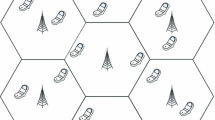Abstract
In this paper, we investigated capacity maximization problem for Multiple Input Multiple Output Orthogonal Frequency Division Multiplexing systems with imperfect channel state information (CSI). To the best of our knowledge, the considered problem is still an open problem. However, the transceiver designs for MIMO OFDM systems have been extensively studied. It seems nobody gives closed-form solutions for resource allocation for MIMO OFDM systems with statistical channel estimation errors up to date. In our work, based on practical channel estimation algorithm, the channel estimation errors are first derived and then the robust resource allocation problem has been formulated. The structure of the optimal robust precoder is first derived, based on which the optimization problem will be simplified significantly. Furthermore, based on the Lagrangian dual method, a robust power allocation algorithm is proposed. The proposed power allocation can be considered as a variant of water-filling solution named cluster water-filling solution. Finally, simulation results show that our proposed robust design outperforms the non-robust design in terms of channel capacity.
创新点
本文中,我们研究了在不完美信道状态信息下,多天线正交频分复用系统的容量最大化问题。这个问题仍然是一个开放性的课题,然而,我们进一步研究了多天线正交频分复用系统中的收发机设计问题。到目前为止,还没有相关的文献给出统计信道估计误差情况下,多天线正交频分复用系统的资源分配的闭式解。本文中,基于实际的信道估计算法,我们推导出了信道估计误差以及给出了资源分配问题的优化形式。我们首先给出了鲁棒性预编码的结构,,在此基础上,优化问题可以进一步被简化。另外,根据拉格朗日对偶算法,我们提出了一种鲁棒性的功率分配算法。提出的功率分配算法可以看做注水算法的一种变形,称为分簇注水算法。最后,仿真结果证明了我们提出的鲁棒性设计要优于非鲁棒性的设计。
Similar content being viewed by others
References
Larsson E G, Stoica P. Space-Time Block Coding for Wireless Communications. Cambridge: Cambridge University Press, 2003
Tse D, Viswanath P. Fundamentals of Wireless Communication. Cambridge: Cambridge University Press. 2005
Bolcskei H, Gesbert D, Papadias C B, et al. Space-Time Wireless Systems: From Array Processing to MIMO Communications. Cambridge: Cambridge University Press. 2006
Luan T X, Gao F F, Zhang X D. Joint resource scheduling for relay-assisted broadband cognitive radio networks. IEEE Trans Wirel Commun, 2012, 11: 3090–3100
Zhu F C, Gao F F, Yao M L, et al. Joint information-and Jamming-beamforming for physical layer security with full duplex base station. IEEE Trans Signal Process, 2014, 62: 6391–6401
Zhang Z S, Long K P, Wang J P, et al. On swarm intelligence inspired self-organized networking: its bionic mechanisms, designing principles and optimization approaches. IEEE Commun Surv Tut, 2014, 16: 513–537
Zhang Z S, Long K P, Wang J P. Self-organization paradigms and optimization approaches for cognitive radio technologies: a survey. IEEE Trans Wirel Commun, 2013, 20: 36–42
Dietrich F A. Robust Signal Processing for Wireless Communications. Foundations in Signal Processing, Communications and Networking. Berlin: Springer Press, 2007
Zheng G, Wong K-K, Paulraj A, et al. Robust collaborative-relay beamforming. IEEE Trans Signal Process, 2009, 57: 3130–3143
Sampath H, Stoica P, Paulraj A. Generalized linear precoder and decoder design for MIMO channels using the weighted MMSE criterion. IEEE Trans Commun, 2001, 49: 2198–2206
Palomar D P, Cioffi J M, Lagunas M A. Joint Tx-Rx beamforming design for multicarrier MIMO channels: a unified framework for convex optimization. IEEE Trans Signal Process, 2003, 51: 2381–2399
Joham M, Utschick W, Nossek J A. Linear transmit processing in MIMO communications systems. IEEE Trans Signal Process, 2005, 53: 2700–2712
Serbetli S, Yener A. Transceiver optimization for mutiuser MIMO systems. IEEE Trans Signal Process, 2004, 52: 214–226
Zhang X, Palomar D P, Ottersten B. Statistically robust design of linear MIMO transceivers. IEEE Trans Signal Process, 2008, 56: 3678–3689
Ding M H, Blostein S D. MIMO minimum total MSE transceiver design with imperfect CSI at both ends. IEEE Trans Signal Process, 2009, 57: 1141–1150
Xing C W, Ma S D, Wu Y C, et al. Transceiver design for dual-hop nonregenerative MIMO-OFDM relay systems under channel uncertainties. IEEE Trans Signal Process, 2010, 58: 6325–6339
Xing C W, Fei Z S, Ma S D. Maximum mutual information design for amplify-and-forward multi-hop MIMO relaying systems under channel uncertainties. In: Wireless Communications and Networking Conference (WCNC), Paris, 2012. 781–786
Xing C W, Ma S D, Fei Z S. A general robust linear transceiver design for multi-hop amplify-and-forward MIMO relaying systems. IEEE Trans Signal Process, 2013, 61: 1196–1209
Rey F, Lamarca M, Vazquez G. Robust power allocation algorithms for MIMO OFDM systems with imperfect CSI. IEEE Trans Signal Process, 2005, 53: 1070–1085
Xing C W, Li D, Ma S D. Robust transceiver design for MIMO-OFDM systems based on cluster water-filling. IEEE Commun Lett, 2013, 17: 1451–1454
Zhang Z S, Zhang W, Tellambura C. Cooperative OFDM channel estimation in the presence of frequency offsets. IEEE Trans Veh Technol, 2009, 58: 3447–3459
Kay S M. Fundamentals of Statistical Signal Processing: Estimation Theory. Upper Saddle River: Prentice Hall PTR, 1993
Yuen C, Hochwald B M. Achieving near-capacity at low SNR on a multiple-antenna multiple-user channel. IEEE Trans Commun, 2009, 57: 69–74
Bertsekas D P, Nedic A, Ozdaglar A E. Convex Analysis and Optimization. Nashua: Athena Scientific, 2003
Conejo A J, Castillo E, Mínguez R, et al. Decomposition Techniques in Mathematical Programming. Berlin: Springer, 2006
Bertsekas D P. Constrained Optimization and Lagrange Multiplier Methods. Nashua: Athena Scientific, 1996
Boyd S, Vandenberghe L. Convex Optimization. Cambridge: Cambridge University Press, 2004
Bertsekas D P. Nonlinear Programming. Nashua: Athena Scientific, 1999
Author information
Authors and Affiliations
Corresponding author
Rights and permissions
About this article
Cite this article
Guo, S., Xing, C., Fei, Z. et al. Robust capacity maximization transceiver design for MIMO OFDM systems. Sci. China Inf. Sci. 59, 062301 (2016). https://doi.org/10.1007/s11432-015-5392-9
Received:
Accepted:
Published:
DOI: https://doi.org/10.1007/s11432-015-5392-9




